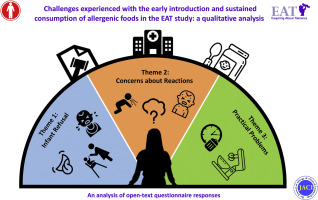当前位置:
X-MOL 学术
›
J. Allergy Clin. Immunol.
›
论文详情
Our official English website, www.x-mol.net, welcomes your
feedback! (Note: you will need to create a separate account there.)
Challenges experienced with early introduction and sustained consumption of allergenic foods in the Enquiring About Tolerance (EAT) study: A qualitative analysis.
Journal of Allergy and Clinical Immunology ( IF 11.4 ) Pub Date : 2019-12-01 , DOI: 10.1016/j.jaci.2019.09.004 Paula Voorheis 1 , Sadie Bell 2 , Laura Cornelsen 2 , Matthew Quaife 2 , Kirsty Logan 3 , Tom Marrs 3 , Suzana Radulovic 3 , Joanna Craven 3 , Carsten Flohr 4 , Gideon Lack 3 , Michael R Perkin 5 ,
Journal of Allergy and Clinical Immunology ( IF 11.4 ) Pub Date : 2019-12-01 , DOI: 10.1016/j.jaci.2019.09.004 Paula Voorheis 1 , Sadie Bell 2 , Laura Cornelsen 2 , Matthew Quaife 2 , Kirsty Logan 3 , Tom Marrs 3 , Suzana Radulovic 3 , Joanna Craven 3 , Carsten Flohr 4 , Gideon Lack 3 , Michael R Perkin 5 ,
Affiliation

|
BACKGROUND
The early introduction group participants of the Enquiring About Tolerance study were asked to undertake a proscriptive regimen of early introduction and sustained consumption of 6 allergenic foods. It was envisaged that this might be challenging, and early introduction group families were presented with an open-text question to express any problems they were experiencing with the regimen in recurring online questionnaires.
OBJECTIVE
We sought to analyze these open-text questionnaire responses with the aim of identifying challenges associated with the introduction and regular consumption of allergenic foods.
METHODS
Three combinations of interim questionnaire responses were selected for analysis, representing the early period (4, 5, and 6 months), middle period (8 and 12 months), and late period (24 and 36 months) of participation in the Enquiring About Tolerance study. Responses were assigned a code to describe their content and subsequently grouped into themes to portray key messages. A thematic content analysis allowed for conversion of qualitative codes into quantitative summaries.
RESULTS
Three main challenges to allergenic food consumption were identified. First, some children refused the allergenic food, causing a sense of defeat among caregivers. Second, caregivers were concerned that allergenic foods might be causing a reaction, triggering a need for reassurance. Third, practical problems associated with the regimen compromised caregivers' capacity to persist.
CONCLUSION
Understanding the challenges experienced with allergenic food introduction and sustained consumption is the necessary precursor to developing specific communication and support strategies that could be used by caregivers, practitioners, policymakers, and key stakeholders to address these problems.
中文翻译:

在“耐受性调查”(EAT) 研究中,早期引入和持续食用致敏食品所经历的挑战:定性分析。
背景 探究耐受性研究的早期引入组参与者被要求采取早期引入并持续食用 6 种过敏食物的规定方案。预计这可能具有挑战性,并且向早期介绍组家庭提出了一个开放文本问题,以表达他们在重复在线问卷中遇到的养生方案的任何问题。目的 我们试图分析这些开放式问卷调查的答复,旨在确定与引入和定期食用过敏食品相关的挑战。方法选取参与调查的早期(4、5、6个月)、中期(8、12个月)、后期(24、36个月)三种中期问卷答复组合进行分析。耐受性研究。回复被分配一个代码来描述其内容,随后分为主题来描述关键信息。主题内容分析可以将定性代码转换为定量摘要。结果 确定了过敏性食品消费的三个主要挑战。首先,一些孩子拒绝食用过敏食物,导致看护者产生挫败感。其次,护理人员担心过敏食物可能会引起反应,从而引发安抚的需要。第三,与该方案相关的实际问题损害了护理人员坚持的能力。结论 了解过敏性食品引入和持续消费所面临的挑战是制定具体沟通和支持策略的必要前提,护理人员、从业者、政策制定者和主要利益相关者可以使用这些策略来解决这些问题。
更新日期:2019-12-04
中文翻译:

在“耐受性调查”(EAT) 研究中,早期引入和持续食用致敏食品所经历的挑战:定性分析。
背景 探究耐受性研究的早期引入组参与者被要求采取早期引入并持续食用 6 种过敏食物的规定方案。预计这可能具有挑战性,并且向早期介绍组家庭提出了一个开放文本问题,以表达他们在重复在线问卷中遇到的养生方案的任何问题。目的 我们试图分析这些开放式问卷调查的答复,旨在确定与引入和定期食用过敏食品相关的挑战。方法选取参与调查的早期(4、5、6个月)、中期(8、12个月)、后期(24、36个月)三种中期问卷答复组合进行分析。耐受性研究。回复被分配一个代码来描述其内容,随后分为主题来描述关键信息。主题内容分析可以将定性代码转换为定量摘要。结果 确定了过敏性食品消费的三个主要挑战。首先,一些孩子拒绝食用过敏食物,导致看护者产生挫败感。其次,护理人员担心过敏食物可能会引起反应,从而引发安抚的需要。第三,与该方案相关的实际问题损害了护理人员坚持的能力。结论 了解过敏性食品引入和持续消费所面临的挑战是制定具体沟通和支持策略的必要前提,护理人员、从业者、政策制定者和主要利益相关者可以使用这些策略来解决这些问题。











































 京公网安备 11010802027423号
京公网安备 11010802027423号